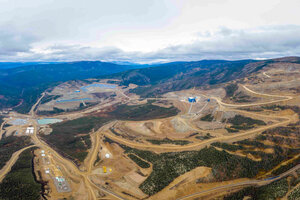“It’s over. Victoria is done,” CEO John McConnell said in an interview with CBC on the day after Victoria Gold Corp. was placed into receivership and the Yukon government took the lead on rehabilitating the Eagle Gold mine site.”They brought in a team to take over from us,” he added.The court decision comes less than two months after the failure of the heap leach pad at Eagle Mine, which escalated into significant challenges for Victoria Gold, resulting in the company’s receivership.In response, Victoria’s board of directors chose to resign, while its shareholders withdrew their support, ultimately resulting in the court order being accepted despite the company’s earlier announcement to fight it.In the interview, McConnell stated he thinks the receivership is “totally unnecessary.””I go from being mad to being sad,” he told CBC. “I get sad because it wipes out all equity shareholder value and probably wipes out the ability to repay our contractors and suppliers both in the Yukon and Western Canada.”As the receivership takes effect, the impact on Victoria Gold’s shareholders has been severe. They’ve been “wiped out,” said McConnell. “Victoria Gold essentially doesn’t exist anymore. They don’t want to be responsible for a project that somebody else is in charge of.”While Victoria Gold approaches its final chapter, McConnell remains focused on the positive strides made by the team in their final days.”I’m very proud of what the team was able to do,” he said, highlighting the company’s efforts to stabilize the heap leach pad and convert the water treatment plant into what he described as “a cyanide destruction plant.”Amid the challenges, McConnell also expressed gratitude for the outpouring of support he’s received from the community. “I’ve had probably 1,000 emails today from Yukoners upset, wishing me well,” he said. “Those are the Yukoners that are my friends and that my family love, and that’s why we’ll be here for a while.”Even so, McConnell acknowledged that his remaining time with the company may be limited. He and senior team members plan to stay on for the transition, but, as he put it, “I’m sure once they’ve got all the knowledge they think they can glean from us, we’ll be sent packing.”Though Victoria Gold’s journey has come to an end, McConnell’s ties to the Yukon remain strong, offering a lasting connection to the community he and his family call home.JustificationAs Victoria Gold transitions out of operations, attention has shifted to the future of the Eagle Gold Mine. With the territorial government now taking a central role in overseeing the site, Yukon Justice Minister Trace-Anne McPhee and other government officials held a technical briefing to provide an update to the public on the site’s status under court-ordered receivership.During the briefing, McPhee expressed optimism, stating that the government is still hopeful mining operations could eventually restart at the site.She further explained that the receivership process provides a “pathway” to manage the company’s finances and assets to ensure they are directed toward environmental mitigation work. In the short term, the government would advance funds to cover “urgent work.”McPhee says the decision to go to court to ask that a receiver assume the company’s work was not to put the company out of business and the decision of Victoria Gold’s board of directors to resign was made “on their own.”However, the minister clarified that the decision to bring in a receiver was driven by the need to address public safety and environmental concerns that many felt Victoria Gold had failed to properly manage.Among the government’s key issues was the company’s refusal to comply with a directive to build a containment berm below the heap leach pad.During the interview with McConnell, he defended this decision, citing safety concerns for Victoria employees to build it.”We would never build a berm like that with no engineering,” he said. “It’s just totally irresponsible in our opinion.”In the end, while both Victoria Gold and the Yukon government aimed to address the dilemma at the Eagle Gold Mine, their approaches diverged significantly. As oversight transitions to new management, the focus remains on tackling the environmental fallout and finding a path forward that meets safety standards and economic goals.Should the Eagle Gold Mine and the broader Dublin Gulch region become operational once more, the foundation built by Victoria Gold is one that won’t be forgotten.
This article was published by:
Visit the original article here

Curtin University, Draslovka partner to advance glycine leaching technology
Reading Time: < 1 minute“The non-toxic amino acid has the potential to replace hazardous chemicals like cyanide in mineral


